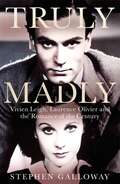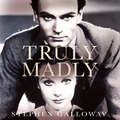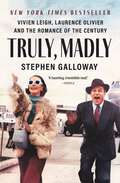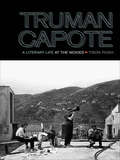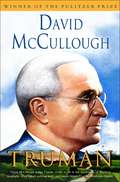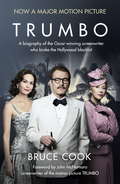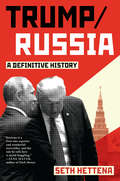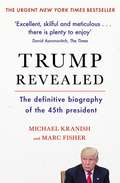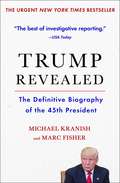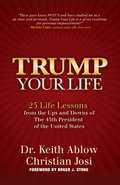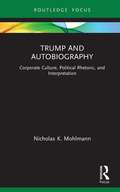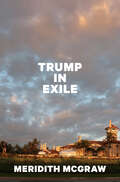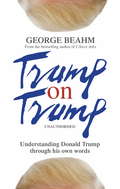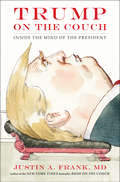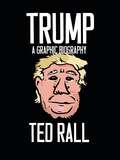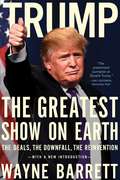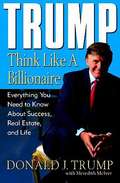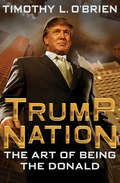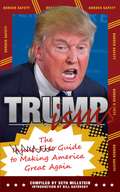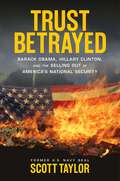- Table View
- List View
Truly Madly: Vivien Leigh, Laurence Olivier and the Romance of the Century
by Stephen GallowayA sweeping and heartbreaking Hollywood biography about the passionate, turbulent marriage of Laurence Olivier and Vivien Leigh.As seen in the Daily Mail and Mail on SundayIn 1934, a friend brought fledgling actress Vivien Leigh to see Theatre Royal, where she would first lay eyes on Laurence Olivier in his brilliant performance as Anthony Cavendish. That night, she confided to a friend, he was the man she was going to marry. There was just one problem: she was already married-and so was he.TRULY, MADLY is the biography of a marriage, a love affair that still captivates millions, even decades after both actors' deaths. Vivien and Larry were two of the first truly global celebrities - their fame fueled by the explosive growth of tabloids and television, which helped and hurt them in equal measure. They seemed to have it all and yet, in their own minds, they were doomed, blighted by her long-undiagnosed mental-illness, which transformed their relationship from the stuff of dreams into a living nightmare.Through new research, including exclusive access to previously unpublished correspondence and interviews with their friends and family, author Stephen Galloway takes readers on a bewitching journey. He brilliantly studies their tempestuous liaison, one that took place against the backdrop of two world wars, the Golden Age of Hollywood and the upheavals of the 1960s - as they struggled with love, loss and the ultimate agony of their parting.
Truly Madly: Vivien Leigh, Laurence Olivier and the Romance of the Century
by Stephen GallowayA sweeping and heartbreaking Hollywood biography about the passionate, turbulent marriage of Laurence Olivier and Vivien Leigh.A New York Times bestsellerAs seen in the Daily Mail and Mail on SundayIn 1934, a friend brought fledgling actress Vivien Leigh to see Theatre Royal, where she would first lay eyes on Laurence Olivier in his brilliant performance as Anthony Cavendish. That night, she confided to a friend, he was the man she was going to marry. There was just one problem: she was already married-and so was he.TRULY, MADLY is the biography of a marriage, a love affair that still captivates millions, even decades after both actors' deaths. Vivien and Larry were two of the first truly global celebrities - their fame fueled by the explosive growth of tabloids and television, which helped and hurt them in equal measure. They seemed to have it all and yet, in their own minds, they were doomed, blighted by her long-undiagnosed mental-illness, which transformed their relationship from the stuff of dreams into a living nightmare.Through new research, including exclusive access to previously unpublished correspondence and interviews with their friends and family, author Stephen Galloway takes readers on a bewitching journey. He brilliantly studies their tempestuous liaison, one that took place against the backdrop of two world wars, the Golden Age of Hollywood and the upheavals of the 1960s - as they struggled with love, loss and the ultimate agony of their parting.
Truly, Madly: Vivien Leigh, Laurence Olivier, and the Romance of the Century
by Stephen GallowayNAMED A BEST BOOK OF THE YEAR BY THE WASHINGTON POST A New York Times Bestseller "A "well rounded and entertaining" (New York Times) Hollywood biography about the passionate, turbulent marriage of Laurence Olivier and Vivien Leigh. In 1934, a friend brought fledgling actress Vivien Leigh to see Theatre Royal, where she would first lay eyes on Laurence Olivier in his brilliant performance as Anthony Cavendish. That night, she confided to a friend, he was the man she was going to marry. There was just one problem: she was already married—and so was he. TRULY, MADLY is the biography of a marriage, a love affair that still captivates millions, even decades after both actors' deaths. Vivien and Larry were two of the first truly global celebrities – their fame fueled by the explosive growth of tabloids and television, which helped and hurt them in equal measure. They seemed to have it all and yet, in their own minds, they were doomed, blighted by her long-undiagnosed mental-illness, which transformed their relationship from the stuff of dreams into a living nightmare. Through new research, including exclusive access to previously unpublished correspondence and interviews with their friends and family, author Stephen Galloway takes readers on a bewitching journey. He brilliantly studies their tempestuous liaison, one that took place against the backdrop of two world wars, the Golden Age of Hollywood and the upheavals of the 1960s — as they struggled with love, loss and the ultimate agony of their parting.
Truman Capote: A Literary Life at the Movies (The South on Screen)
by Tison PughThe author of Queer Chivalry presents a biographical study of the celebrity writer &“rich with insight into [his] literary and cinematic achievements&” (Publishers Weekly). Truman Capote&’s legacy is in many ways defined by his complex relationship with Hollywood. In Truman Capote: A Literary Life at the Movies, Tison Pugh explores the author and his literature through a cinematic lens, weaving elements of Capote&’s biography—including his flamboyant public persona and his friendships and feuds with notable stars—with critical analysis of the films, screenplays, and adaptations of his works. Capote&’s masterful prose made him an iconic twentieth century author, and his screenplays, including Beat the Devil, Indiscretion of an American Wife, and The Innocents, allowed him to collaborate with such Hollywood heavyweights as Humphrey Bogart, John Huston, and David O. Selznick. But the beloved and acclaimed adaptations of his literature, most notably Breakfast at Tiffany&’s and In Cold Blood, undercut his daring treatment of homosexuality in favor of heterosexual romance. Pugh demonstrates how Capote&’s gay southern identity influenced perceptions of his literature and its adaptations. Illuminating Capote&’s successes and disappointments in the film industry, Pugh delivers a revealing and nuanced portrait of the author&’s literary life.
Truman: The Personal Correspondence Of Harry S. Truman And Dean Acheson, 1953-1971 (Reading Group Guides Ser.)
by David McCulloughThe Pulitzer Prize–winning biography of Harry S. Truman, whose presidency included momentous events from the atomic bombing of Japan to the outbreak of the Cold War and the Korean War, told by America&’s beloved and distinguished historian.The life of Harry S. Truman is one of the greatest of American stories, filled with vivid characters—Roosevelt, Churchill, Stalin, Eleanor Roosevelt, Bess Wallace Truman, George Marshall, Joe McCarthy, and Dean Acheson—and dramatic events. In this riveting biography, acclaimed historian David McCullough not only captures the man—a more complex, informed, and determined man than ever before imagined—but also the turbulent times in which he rose, boldly, to meet unprecedented challenges. The last president to serve as a living link between the nineteenth and the twentieth centuries, Truman’s story spans the raw world of the Missouri frontier, World War I, the powerful Pendergast machine of Kansas City, the legendary Whistle-Stop Campaign of 1948, and the decisions to drop the atomic bomb, confront Stalin at Potsdam, send troops to Korea, and fire General MacArthur. Drawing on newly discovered archival material and extensive interviews with Truman’s own family, friends, and Washington colleagues, McCullough tells the deeply moving story of the seemingly ordinary “man from Missouri” who was perhaps the most courageous president in our history.
Trumbo: A biography of the Oscar-winning screenwriter who broke the Hollywood blacklist - Now a major motion picture
by Bruce CookNOMINATED FOR OSCAR, BAFTA AND GOLDEN GLOBE AWARDS (BRYAN CRANSTON, BEST ACTOR)Dalton Trumbo was the central figure of the infamous 'Hollywood Ten,' the screenwriters who, during the McCarthy era, were charged by the House Committee on Un-American Acitivities for their associations with the Communist Party. Due to their refusal to cooperate during the investigation, Trumbo and his fellow screenwriters were declared in contempt of Congress and were ultimately blacklisted from Hollywood and some were even jailed. Although Trumbo was one of several hundred writers, directors, producers, and actors who were deprived of the opportunity to work in the motion picture industry from 1947 to 1960, he won an Oscar under the pseudonym Robert Rich for The Brave One in 1956, and he was the first to see his name on the big screen again in 1960 with Exodus, one of the year's biggest movies.All his life Trumbo was a radical of the homegrown, independent variety. From his early days in Colorado, where his grandfather was a county sheriff, to his time in Los Angeles, where he organized a bakery strike and was even a bootlegger, to his time as an author when he wrote the powerful pacifist novel Johnny Got His Gun, to his heyday as a top-paid (and frequently broke) Hollywood screenwriter-where his credits include Roman Holiday, Spartacus, Papillon, Lonely Are the Brave, Thirty Seconds Over Tokyo, The Brave One, and Kitty Foyle-his life rivaled anything he had created.Written with Dalton Trumbo's full cooperation, at a moment when he himself did not know how much time he had left, Trumbo is a candid tale of a colorful figure who was at the epicenter of a tumultuous period in recent American history.
Trump
by Beyond Books EditorsOnly one man stands above the herd this election season, but who is he? What does he stand for? Here in this ultimate collection of his best quotes we meet the billionaire, mogul, TV star, and (possibly) the next President of the United States of America--Donald Trump.Trump: The Good, the Bad, and the Quotable is the ultimate collection of Donald Trump's best lines on everything he loves to talk about: women he loves, women he hates, the American Dream, immigrants he hates, the power of money, and most important of all: himself. With over two hundred of his wittiest, most humorous quotes, plus a shrink's exclusive psychological diagnosis of Trump, this collection shows us the real Trump--who we just can't get enough of. Or, as Trump once put in an interview with Playboy, "The show is Trump. And it is sold-out performances everywhere." So get your ticket today.
Trump / Russia: A Definitive History
by Seth Hettena"Hettena is a first-rate reporter and wonderful story-teller, and the tale he tells here is mind-boggling."—Jane Mayer, author of New York Times bestseller Dark MoneyUncovering the sordid history of the decades-long association between Donald Trump and Russia"Seth Hettena skillfully weaves many threads—most fresh or previously hidden—into a rich tapestry tying together decades of Donald Trump s deep involvement with Russia." —DAVID CAY JOHNSTON , author of the New York Times bestseller The Making of Donald Trump Is the 45th President of the United States under the control of a foreign power? Award-winning Associated Press reporter Seth Hettena untangles the story of Donald Trump’s long involvement with Russia in damning detail—including new reporting never before published. As Special Counsel Robert Mueller’s investigation into the relationship between members of Trump’s campaign and Russian operatives continues, there is growing evidence that Trump has spent decades cultivating ties to corrupt Russians and the post-Soviet state. In Trump/Russia: A Definitive History, Seth Hettena chronicles the many years Trump has spent wooing Russian money and power. From the collapse of his casino empire—which left Trump desperate for cash—and his first contacts with Russian deal-makers and financiers, on up to the White House, Hettena reveals the myriad of shady people, convoluted dealings, and strange events that suggest how indebted to Russia our forty-fifth president might be. Using deeply researched reporting, along with newly uncovered information, court documents, and exclusive interviews with investigators and FBI agents, Hettena provides an expansive and essential primer to the Trump/Russia scandal, leaving no stone unturned.
Trump Must Go: The Top 100 Reasons to Dump Trump (and One to Keep Him)
by Bill Press"I would give myself an A+" —Donald Trump, on his first 100 days in office. Americans increasingly agree on one thing: Every day that Trump stays in office, he diminishes the United States and its people. In Trump Must Go, TV and radio host Bill Press offers 100 reasons why Trump needs to be removed from office, whether by impeachment, the 25th Amendment, or the ballot box. Beginning with the man himself and moving through Trump’s executive action damage, Press covers Trump's debasement of the United States political system and degrading of the American presidency. Ranging from banning federal employees’ use of the phrase “climate change,” to putting down Haiti, El Salvador, and African nations as “shithole” countries, we have to wonder what he’ll do next. He has a bromance with Putin that enables several meetings between Trump staffers and Russian officials, and he has a wrecking crew administration: Attorney General Jeff Sessions, Education Secretary Betsy DeVos, and Housing Secretary Ben Carson, to name a few. Extensive “executive time” marks Trump’s calendar so he can golf, watch TV, and eat fast food. Trump has done it all…badly. But, in a political climate where the world has learned to expect the unexpected, Press offers readers a twist: one reason not to ditch Donald Trump.
Trump Revealed: An American Journey Of Ambition, Ego, Money, And Power
by Marc Fisher Michael Kranish<P>A comprehensive biography of Donald Trump, the Republican candidate in the presidential election campaign. Trump Revealed will be reported by a team of award-winning Washington Post journalists and co-authored by investigative political reporter Michael Kranish and senior editor Marc Fisher. <P>Trump Revealed will offer the most thorough and wide-ranging examination of Donald Trump's public and private lives to date, from his upbringing in Queens and formative years at the New York Military Academy, to his turbulent careers in real estate and entertainment, to his astonishing rise as the Republican presidential nominee. <P>The book will be based on the investigative reporting of more than two dozen Washington Post reporters and researchers who will leverage their expertise in politics, business, legal affairs, sports and other areas. The effort will be guided by a team of editors headed by Executive Editor Martin Baron, who joined the newspaper in 2013 after his successful tenure running The Boston Globe, which included the "Spotlight" team's investigation of sexual abuse in the Catholic Church. <P><b>A New York Times Bestseller</b>
Trump Revealed: An American Journey of Ambition, Ego, Money, and Power
by Marc Fisher Michael KranishA comprehensive biography of Donald Trump, the Republican front-runner in the presidential election campaign. <P><P>Trump Revealed will be reported by a team of award-winning Washington Post journalists and co-authored by investigative political reporter Michael Kranish and senior editor Marc Fisher. <P>Trump Revealed will offer the most thorough and wide-ranging examination of Donald Trump's public and private lives to date, from his upbringing in Queens and formative years at the New York Military Academy, to his turbulent careers in real estate and entertainment, to his astonishing rise as the front-runner for the Republican presidential nomination. <P>The book will be based on the investigative reporting of more than two dozen Washington Post reporters and researchers who will leverage their expertise in politics, business, legal affairs, sports, and other areas. <P>The effort will be guided by a team of editors headed by Executive Editor Martin Baron, who joined the newspaper in 2013 after his successful tenure running The Boston Globe, which included the "Spotlight" team's investigation of sexual abuse in the Catholic Church. <P><b>A New York Times Bestseller</b>
Trump Your Life: 25 Life Lessons from the Ups and Downs of The 45th President of the United States
by Keith R. Ablow Christian JosILove him or not, it is undeniable that there’s an awful lot to learn from President Donald Trump’s life and his approach to it. With Trump Your Life, readers can become more resolute, resourceful, and resilient than ever. Dr. Keith Ablow and Christian Josi (with help in the form of a foreword by the one and only Roger Stone) have combined in-depth personal experience with the president and decades of creative, political and media work with renowned skills in psychological analysis to create this concise, entertaining and highly enlightening manual for those who want to win. Trump Your Life delivers 25 key lessons from President Trump’s life to help readers make their own lives more fulfilling, successful, and powerful. Anyone can make his or her life great---or great again—using the keys found in Trump Your Life to transforming relationships, revolutionizing one’s approach to work, achieving the success one has dreamt of, or revitalizing one’s family, community, or even country. Makes a great gift.
Trump and Autobiography: Corporate Culture, Political Rhetoric, and Interpretation (Routledge Focus on Literature)
by Nicholas K. MohlmannThe 1970s and 1980s heralded the rise of neoliberalism in United States culture, fundamentally reshaping life and work in the United States. Corporate culture increasingly penetrated other aspects of American life through popular press CEO autobiographies and management books that encouraged individuals to understand their lives in corporate terms. Propelled into the public eye by the publication of 1989’s The Art of the Deal, ostensibly a CEO autobiography, Donald Trump has made a career out of reversing the autobiographical impulse, presenting an image of his life that meets his narrative needs. While many scholars have sought a political precedent for Trump’s rise to power, this book argues that Trump’s aesthetics and life production uniquely primed him for populist political success through their reliance on the tropes of popular corporate culture. Trump and Autobiography contextualizes Trump’s autobiographical works as an extension of the popular corporate culture of the 1980s in order to examine how Trump constructs an image of himself that is indebted to the forms, genres, and mechanisms of corporate speech and narrative. Ultimately, this book suggests that Trump’s appeal and resilience rest in his ability to signify as though he is a corporation, revealing the degree to which corporate culture has reshaped American society’s interpretive processes.
Trump and Me
by Mark SingerEver since Donald Trump entered the presidential race--in a press conference attended by paid actors, in which he slandered Mexican immigrants--he has dominated headlines, becoming the unrestrained id at the center of one of the most bizarre and alarming elections in American history.It was not always so. In 1996, longtime New Yorker writer Mark Singer was conscripted by his editor to profile Donald Trump. At that time Trump was a mere Manhattan-centric megalomaniac, a failing casino operator mired in his second divorce and (he claimed) recovering from the bankruptcy proceedings that prompted him to inventory the contents of his Trump Tower home. Conversing with Trump in his offices, apartments, cars, and private plane, Singer found himself fascinated with this man "who had aspired to and achieved the ultimate luxury, an existence unmolested by the rumbling of a soul."In Trump and Me, Singer revisits the profile and recounts how its publication lodged inside its subject's head as an enduring irritant--and how Singer ("A TOTAL LOSER!" according to Trump) cheerfully continued to bait him. He reflects on Trump's evolution from swaggering buffoon to potential threat to America's standing as a rational guardian of the world order. Heedlessly combative, equally adept at spewing insults and manipulating crowds at his campaign rallies, the self-proclaimed billionaire has emerged as an unlikely tribune of populist rage. All politics is artifice, and Singer marvels at how Trump has transfixed an electorate with his ultimate feat of performance art--a mass political movement only loosely tethered to reality.From the Hardcover edition.
Trump in Exile
by Meridith McGrawFilled with deep insights and never-before-seen details, Trump in Exile is an explosive, all-access account from behind the scenes at Mar-a-Lago as former president Donald Trump regroups from an election defeat that he refuses to acknowledge and plots his return. The Capitol riots on January 6, 2021, put a horrific closing note on a norm-shattering presidency, as the twice-impeached Donald Trump rode a wave of denial and resentment out of 1600 Pennsylvania Avenue and crashed back at Mar-a-Lago—seemingly wounded, seemingly done. But he wasn&’t. And what, exactly, was he building in there? Meridith McGraw vividly chronicles the incredible period of Trump&’s exile in South Florida—a postpresidency like no other in American history—and brings us inside the gilded walls of his private club, where an alternate reality in which the 2020 election was stolen became Republican Party orthodoxy. How did the country go from Trump&’s political banishment to his renewed dominance over his party, as he effortlessly destroyed the once-formidable Ron DeSantis and now stands on the verge of returning to the White House—all while facing the heavy shadow of multiple federal and state criminal indictments? The Mar-a-Lago period is essential for understanding Trump&’s implausible resurgence and the many missed opportunities to stop him. From a reporter who has covered the Trump era from its beginning, through the White House years, to his 2024 campaign, Meridith McGraw&’s Trump in Exile is riveting contemporary history, vital to our understanding of this defining American moment.
Trump on Trump
by George BeahmOne thing you cannot deny about Donald Trump is that he speaks his mind... and the results are fascinating!Get to know how that mind works by reading his words. This is an unbiased collection of Trump's most famous and interesting quotes and thus an unofficial guide to his thinking.Brash, outspoken and successful, Donald Trump is a political phenomenon. Some of his more contentious comments have outraged the immigrant community, feminist groups and even the Pope. Whether you like him or loathe him, he's impossible to ignore.Now you can understand more about this most infamous public figure and form your own opinion about the way he thinks. Covering the time since Trump announced that he was running for Republican candidacy, this book looks at excerpts and speeches and puts them into context. Among many topics it covers his views on business, America and other countries; his opinion of himself, women and those who stand, or have stood, against him.This is a fascinating insight into the world's most controversial politician.
Trump on the Couch: Inside the Mind of the President
by Justin A. Frank"A great public service--critical for our time."--Bandy X. Lee, M.D., M.Div., Yale psychiatrist, expert on violence, and editor of The Dangerous Case of Donald TrumpThe New York Times-bestselling author of Bush on the Couch shows that Donald Trump is mentally and emotionally unfit to execute the duties of President.No president in the history of the United States has inspired more alarm and confusion than Donald Trump. As questions and concerns about his decisions, behavior, and qualifications for office have multiplied, they point to one primary question: Does he pose a genuine threat to our country? The American Psychiatric Association's Goldwater Rule constrains psychiatrists from offering diagnoses on public figures who are not patients and who have not endorsed such statements. But in Trump on the Couch Clinical Professor of Psychiatry Justin A Frank invokes the moral responsibility that compels him to speak out and present a full portrait of a man who presents us with a clear and present danger.Using observations gained from a close study of Trump's patterns of thought, action, and communication, Dr. Frank uncovers a personality riddled with mental health issues. His analysis is filled with important revelations about our nation's leader, including disturbing insights into his childhood, his family, his business dealings, and his unusual relationship with alternative facts, including how * The absence of a strong maternal force during childhood has led to Trump's remarkable lack of empathy and disregard for women's boundaries; * His compulsion to polarize America has grown out of the way he perceives the world as full of deceitful and destructive persecutors; * His inability to tolerate the pain of frustration has triggered his belief that omnipotence will finally remove it; * His idiosyncratic use of language points to larger issues than even his tweets might suggest.With our country itself at stake, Dr. Frank calls attention to the underlying narcissism, misogyny, deception, and racism that drive the President who endangers it. A penetrating examination of how we as a nation got here and, more important, where we are going, Trump on the Couch sounds a call to action that we cannot ignore.
Trump: A Graphic Biography
by Ted RallReal Estate Billionaire. Reality TV star. President?Donald Trump inherited a fortune from his father. But he wanted more.Shrewd and indefatigable, he never missed an opportunity to expand his holdings. He transformed himself into an international brand. He marketed his personality into a product. He built an empire. But that wasn&’t enough. He wanted to be President, and he was willing to do and say whatever it took.Donald Trump, who never held political office, pulled off his ultimate acquisition: the hostile takeover of the Republican Party. Everyone was shocked — except those who knew him.
Trump: The Deals, the Downfall, the Reinvention
by Wayne BarrettThe essential book to understanding Donald Trump as a businessman and leader--and how the biggest deal of his life went down. Now, Barrett's classic book is back in print for the first time in years and with an introduction about Trump's 2016 presidential campaign. Donald Trump claims that his success as a "self-made" businessman and real estate developer proves that he will make an effective president, but this devastating investigative account by legendary reporter Wayne Barrett proves otherwise. Back in print for the first time in years, Barrett's seminal book reveals how Trump put together the biggest deal of his life--Trump Tower--through manipulation and deceit; how he worked with questionable characters from the mafia and city politics; and how it all nearly came crashing down. Here is a vivid and inglorious portrait of the man who wants now to be the most powerful man in the world. In Trump: The Greatest Show in the World--The Deals, the Downfall, the Deals, Barrett unravels the myth and reveals the truth behind the mogul's wheelings and dealings. After decades covering him, few reporters know Trump as Barrett does. Instead of the canny businessman that Trump claims in his own books, Barrett explores how Trump exploited his father's banking and political connections to finance and grease his first major deals. Barrett's investigative biography takes us from the days of Donald's lonely youth to his brash entry into the real estate market, and to the back room deals behind his New York, Atlantic City and Florida projects. Most compellingly Barrett paints an intimate portrait of Trump himself, a man driven by bravado, obsessive self-regard, and an anxious ruthlessness to subdue his rivals and seduce anyone with the power to aid his empire. We see him head to head with an opponent as powerful as Pete Rozelle, ingratiating himself with the brooding governor on the Hudson, and fueling the Drexel engine driven by Michael Milken with hundreds of millions in fees--paid, ironically, by gaming companies to fend off Trump takeovers. We explore his complicated emotional and business relationship with his first wife, Ivana, and the use he planned to make of his mistress--and later, his second wife--Marla Maples as a "southern strategy" in his then contemplated presidential campaign. With interviews with scores of adversaries and former colleagues, we are given a privileged look at Trump the businessman in action--reckless as often as he is brilliant, reliant on threats as much as on charm, and ultimately a cautionary tale: is this the man we want to lead the world? PRAISE FOR TRUMP: "Trump is a withering portrait of the most self-mythologized and promoted businessman of our era, an exhaustively researched and long-overdue antidote to Trump's own books. It is a penetrating portrait of the age that spawned him and the many who aided and abetted his rise. Trump seems destined to be the definitive account of how Trump got ahead and why he fell. It is a sad story, with important lessons for us all." --James B. Stewart, Pulitzer Prize-winning author of Den of Thieves "Donald Trump surprises us again. Wayne Barrett's Trump is a fresh, detailed, and vivid account of the tangled connections of money, politics, and power in our times." --Nicholas Pileggi, author of Wiseguy
Trump: Think Like a Billionaire
by Donald J. TrumpIt's not good enough to want it. You've got to know how to get it. Real estate titan, bestselling author, and TV star Donald J. Trump is the man to teach you the billionaire mind-set-how to think about money, career skills, and life. Here is crucial advice on investing in real estate from the expert, everything from dealing with brokers to renovating to assessing the value of property, buying and selling, and securing a mortgage. Trump will show you how to cut costs, decide how much risk to assume i...
TrumpNation: The Art of Being The Donald
by Timothy L. O'BrienDonald Trump called this book "terribly written," sued the author for $5 billion--and lost. For anyone wondering what life might be like under President Trump, this field guide through TrumpNation offers a probing, often hilarious, and thoroughly definitive account of the man behind the hype. Available for the first time in a decade, with a new introduction by the author, this myth-busting look inside the world of Donald Trump is chock full of rip-roaring anecdotes, jaw-dropping quotes, and rigorous research into the business deals, political antics, curious relationships, and complex background of the leading Republican presidential candidate. Granted unprecedented access, Timothy L. O'Brien traveled across the country and up and down the East Coast with Trump on his private jet, wheeled around Palm Beach with him in his Ferrari, and spent hours interviewing him in his home, in his office, and on the golf course. He met with the entrepreneur's closest friends and most aggressive rivals, while compiling a treasure trove of Trumpisms from the Donald himself: Trump on the public's enduring fascination with Trump: "There is something crazy, hot, a phenomenon out there about me, but I'm not sure I can define it and I'm not sure I want to." Trump on naysayers: "You can go ahead and speak to guys who have four-hundred-pound wives at home who are jealous of me, but the guys who really know me know I'm a great builder." Trump on the art of self-promotion: "You might as well tell people how great you are, because no one else is going to." Ultimately, when O'Brien's research revealed that Trump's business record and annual spot on the Forbes 400 list of richest Americans might be more fantasy than reality, he--like so many others who have dared to tangle with the former host of The Apprentice--found himself in a courtroom. In a new introduction, O'Brien reflects on the recent wave of TrumpMania and updates readers on what it's like to depose one of the world's most litigious businessmen--and win. Be careful what you wish for, America, because--spoiler alert!--the Donald is a sore loser.
Trumpisms
by Seth MillsteinOne may think that Donald Trump knows what he’s talking about. After all, the man--as he’ll remind you at every opportunity--has made a whopping $4 million as an entrepreneur and is far ahead of his competitors in the race to become the republican nominee for the 2016 presidential election. He’s also assertive, bold, self-assured, and argumentative. He talks as if he knows what he’s talking about. And then reality sets it. He can’t actually believe the ludicrous things that come out of his mouth. Or can he? This brilliant, hilarious, and horrifying collection is a compilation of more than one hundred of the most mind-boggling, insane, crass, ignorant, and downright offensive statements he's made, Tweeted, or otherwise written. We’ll cover his thoughts on public policy, international relations, President Barack Obama, his opponents, himself--and much, much more. So buckle up, America, because common sense, experience, grace, and political knowledge--who needs them? As Trump said, he will be one of the greatest presidents "that God ever created. ”
Trumps Wall: The Battle on Immigration
by Donald F. KettlThe Battle on Immigration attempts to answer those questions in a brief, non-partisan chapter written by award winning political scientist Donald F. Kettl. Written as a supplement for American Government or Media and Politics courses, this chapter charts the remarkable rhetoric and policy battles surrounding President Trump's immigration promises--and how these battles provide sharp insight into Trump's strategies and tactics.
Trust Betrayed: Barack Obama, Hillary Clinton, and the Selling Out of America's National Security
by Scott TaylorLoose Lips Sink Ships Every American knows the old World War II saying-but ex-Navy SEAL sniper Scott Taylor believes today's leaders have forgotten it. After serving his country for eight years and watching brave comrades die, Taylor came home to a White House that leaks sensitive intelligence information whenever politically expedient. Now, on behalf of all the men and women in uniform whose lives are in jeopardy, Taylor is speaking out.
